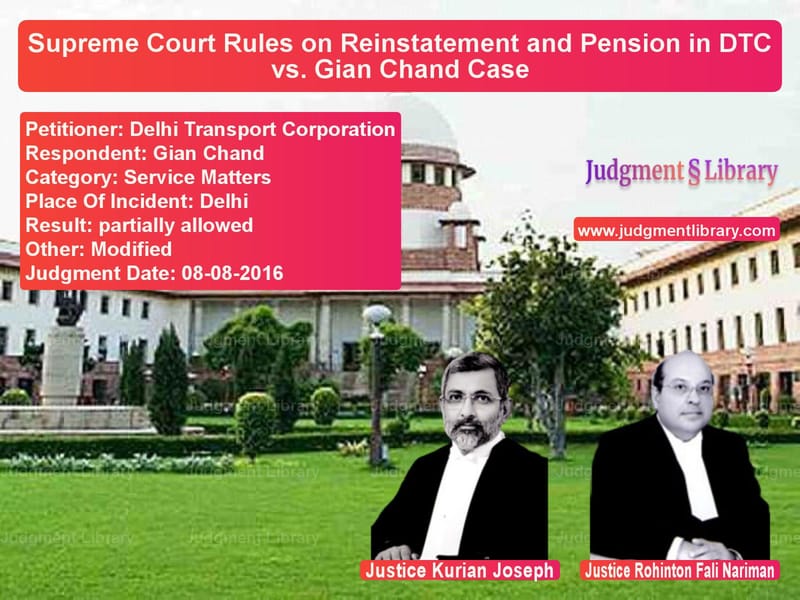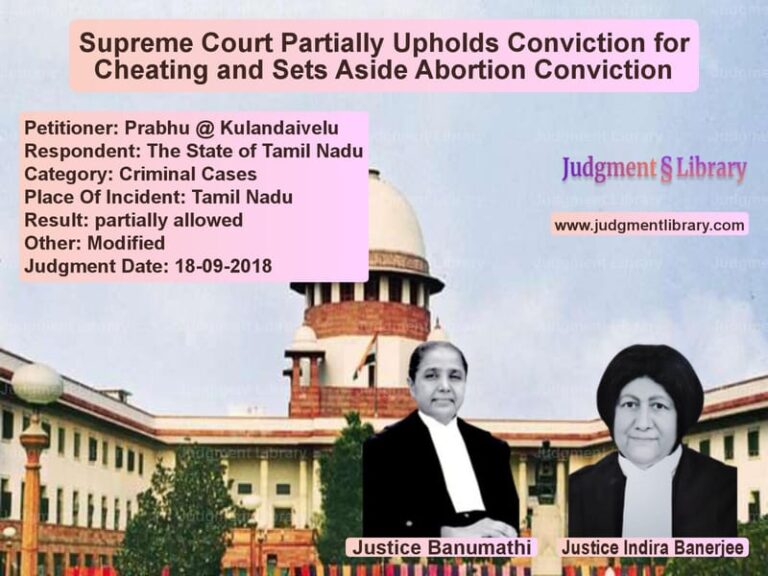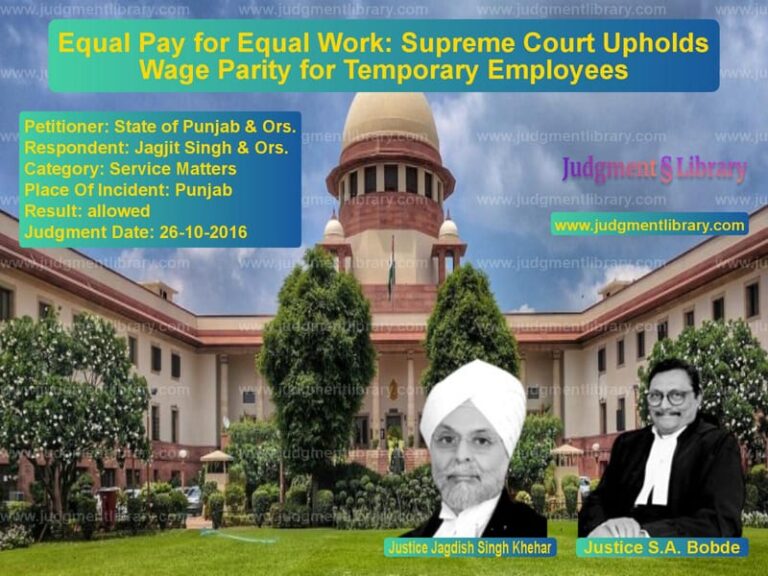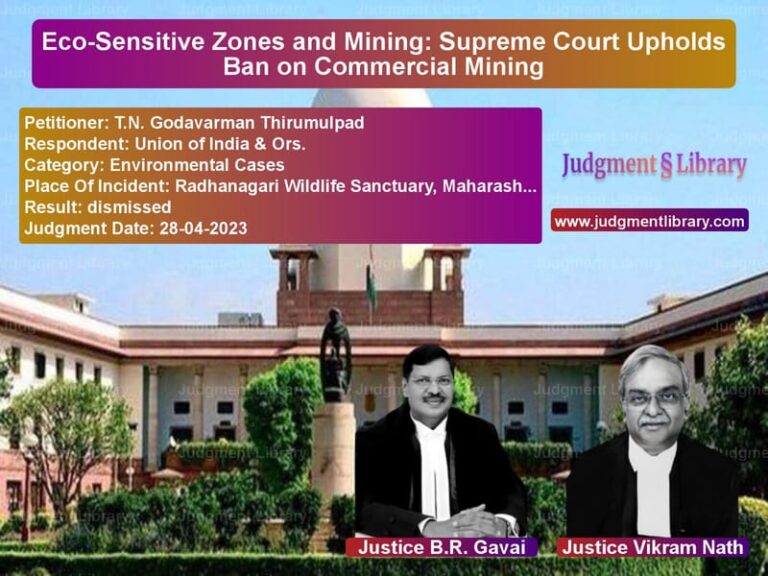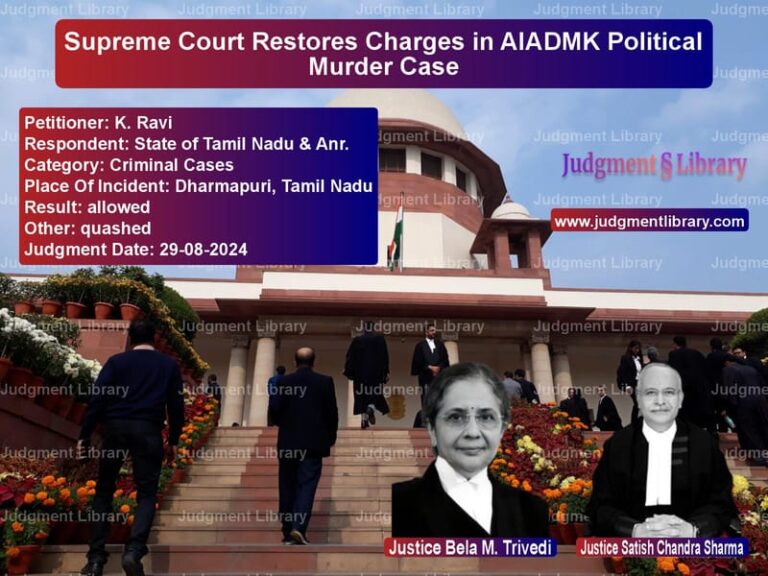Supreme Court Rules on Reinstatement and Pension in DTC vs. Gian Chand Case
The case of DTC v. Gian Chand revolved around the reinstatement of an employee of the Delhi Transport Corporation (DTC) with back wages and pension benefits. The Supreme Court, in its judgment dated August 8, 2016, upheld the reinstatement of the respondent but set aside the award of back wages while ensuring that all other consequential benefits, including the option for pension, would be provided.
Background of the Case
The dispute began when Gian Chand, an employee of DTC, was removed from service. He challenged the termination, leading to an order by the High Court of Delhi directing his reinstatement along with 60% back wages. DTC, dissatisfied with this decision, appealed to the Supreme Court, arguing against the payment of back wages.
Legal Issues
- Whether the High Court was justified in awarding 60% back wages along with reinstatement.
- Whether an employee who was removed from service and later reinstated should be given an opportunity to opt for pension.
- Whether the respondent was entitled to full consequential benefits despite not receiving back wages.
Petitioner’s Arguments (Delhi Transport Corporation)
DTC argued:
- The respondent’s removal was justified, and reinstatement should not have been ordered.
- If reinstatement was to be granted, awarding back wages was excessive and unwarranted.
- The respondent’s absence from service for a significant period should impact his entitlement to benefits.
Respondent’s Arguments (Gian Chand)
The respondent countered:
- The High Court had rightly reinstated him with back wages as compensation for wrongful termination.
- He had been deprived of his right to pension due to his removal from service at the time when the option was given.
- His reinstatement should include full monetary and service benefits.
Supreme Court’s Observations and Ruling
1. Reinstatement Upheld, Back Wages Vacated
The Court ruled that reinstatement was appropriate but back wages were not justified:
“We are of the view that there is no justification in awarding back wages in the facts of the present case.”
By vacating the back wages, the Court balanced the reinstatement order with fairness to the employer.
2. Full Consequential Benefits to Follow
The Court clarified that reinstatement included all service-related benefits:
“All other consequential benefits will follow, which would mean that the respondent would be reinstated as per the award with continuity of service, but without any back wages.”
This ensured that the respondent did not suffer career disadvantages due to the wrongful termination.
3. Fresh Opportunity for Pension Option
The Court addressed the issue of pension eligibility:
“In case the respondent has been denied an option for pension in view of the fact that at the relevant time of option, he was not in service, now that he is deemed to be in service for all other benefits except the monetary benefits, he shall be given fresh opportunity for an option for pension before his date of superannuation.”
This ruling ensured that the respondent could exercise his right to opt for pension, a benefit he was previously denied due to his absence from service.
Final Verdict
The Supreme Court ruled:
- The order for reinstatement was upheld.
- The award of 60% back wages was vacated.
- The respondent would receive all other service-related benefits.
- The respondent would be given an opportunity to opt for pension before superannuation.
- The appeal was disposed of with no costs awarded.
Key Takeaways
- Reinstatement does not automatically entitle an employee to back wages.
- Employees wrongfully removed from service should not be denied their service benefits upon reinstatement.
- Pension eligibility should be reconsidered if an employee was unable to exercise the option due to wrongful termination.
- The Supreme Court prioritizes fairness by ensuring service continuity without imposing excessive financial burdens on employers.
Impact of the Judgment
The ruling has significant implications for employment disputes:
- It clarifies the principles governing back wages upon reinstatement.
- It ensures that wrongful termination does not deprive employees of long-term benefits like pension.
- It establishes that reinstated employees should receive full service continuity.
In conclusion, the Supreme Court’s decision in DTC v. Gian Chand strikes a balance between employee rights and employer interests, reinforcing fair employment practices in public sector organizations.
Don’t miss out on the full details! Download the complete judgment in PDF format below and gain valuable insights instantly!
Download Judgment: Delhi Transport Corp vs Gian Chand Supreme Court of India Judgment Dated 08-08-2016-1741878491739.pdf
Direct Downlaod Judgment: Direct downlaod this Judgment
See all petitions in Employment Disputes
See all petitions in Pension and Gratuity
See all petitions in Judgment by Kurian Joseph
See all petitions in Judgment by Rohinton Fali Nariman
See all petitions in partially allowed
See all petitions in Modified
See all petitions in supreme court of India judgments August 2016
See all petitions in 2016 judgments
See all posts in Service Matters Category
See all allowed petitions in Service Matters Category
See all Dismissed petitions in Service Matters Category
See all partially allowed petitions in Service Matters Category

